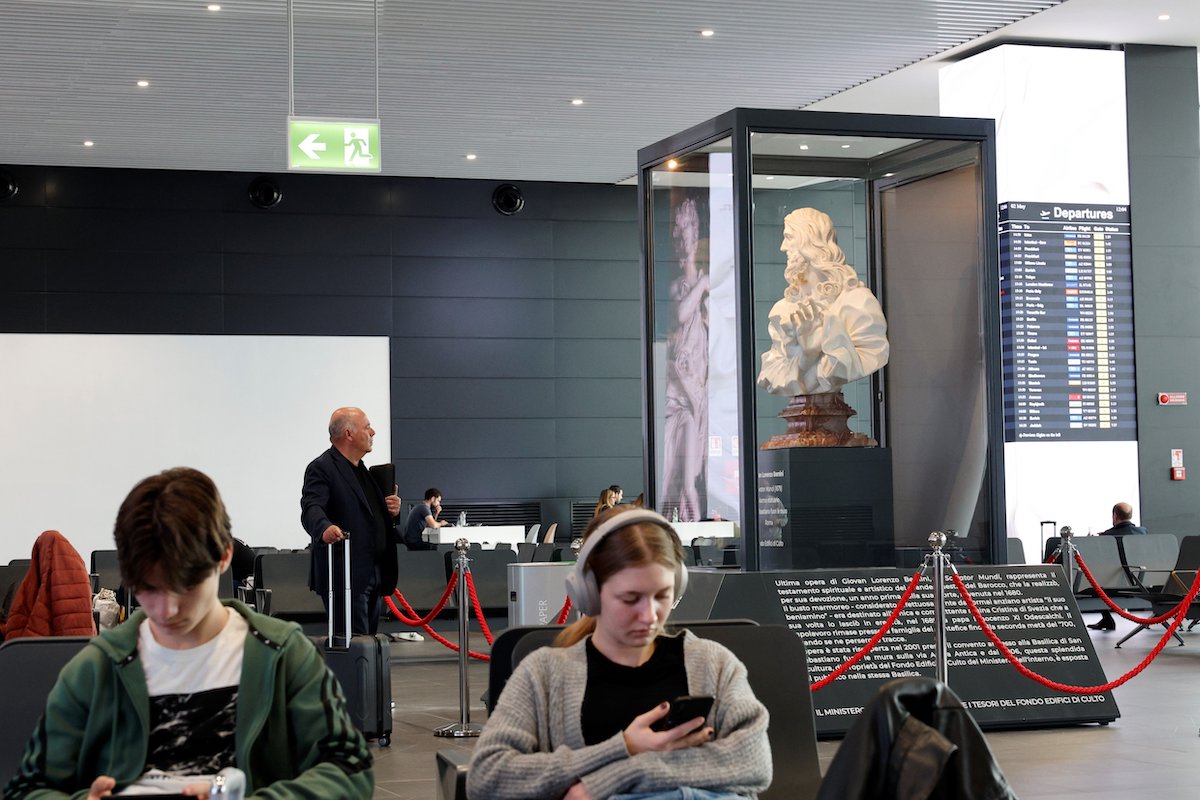By Justin McLellan, Catholic News Service
ROME (CNS) — Alongside departure listings and boarding gates, the 35,000 passengers who walk through Terminal 1 at Rome’s largest airport each day can also see a marble masterpiece of Christ on their way to catch a flight.
“Salvator Mundi” or “Savior of the World,” which depicts Christ raising his hand in blessing, was sculpted by Baroque master Gian Lorenzo Bernini in 1679. It was the artist’s final work and is considered his spiritual testimony.
And until July 12, it stands over a sea of curious recent arrivals to the Eternal City and bored departees lazily awaiting flights. The temporary display was launched April 12 by Rome’s Leonardo da Vinci-Fiumicino Airport in partnership with the Italian Ministry of Culture.
“We are the city of Rome, which contains Vatican City in our territory, so of course Catholicism is part of our culture,” said Veronica Pamio, vice president of external relations at the airport, on the selection of the sculpture.
“As a point of entry into the country we want to be a window into the beauty of Italy. The ‘Salvator Mundi’ has a deep religious value but also value for anyone who was born and raised in Italy, because it represents Italian culture,” she told Catholic News Service May 5.
For centuries, Bernini has wowed pilgrims who come to Rome. He designed the massive bronze baldachin that stands over the high altar of St. Peter’s Basilica and the colonnade that encompasses St. Peter’s Square.
Yet unlike his other works, the imposing statue of Christ, scaled 1.5 times larger than a life-sized representation, was not intended for public display.
Bernini, who completed the work at the age of 80, kept it in his home until his death just months later. He left it to Queen Cristina of Sweden, a Catholic convert who was eventually buried in the grotto of St. Peter’s Basilica. Upon her death, she gave the sculpture to Pope Innocent XI before it plunged into obscurity.
While several copies thought to be originals were found around the world over the centuries, it wasn’t until 2001 that what is now widely agreed to be the original sculpture was rediscovered in a Roman church by art historian Francesco Petrucci.
“It was a personal gift given to the pope, it wasn’t a gift to the church, so often these historical objects are found in the collections of the popes’ families,” he told CNS.
By observing the style of the sculpture’s hands and face, Petrucci said he was able to identify the sculpture as a Bernini original and later matched it to the artist’s written description of the piece.
Petrucci told CNS that the work is among Bernini’s greatest, since it represents the pinnacle of the artist’s spirituality, which grew stronger as he approached death.
“In the last stage of his life, Bernini dedicated his thoughts and creativity to spiritual subjects, to Christ and the message of the Gospel,” he said. “‘Salvator Mundi’ was his last work, so the idea of death and resurrection was deeply tied to this figure of the savior of the world, who saves humanity through his extreme sacrifice.”
Petrucci noted that immediately prior to completing “Salvator Mundi,” Bernini drew a sketch of the Crucifixion — titled “Sanguis Christi” — in which the crucified Christ is carried toward heaven by angels while his open wounds create a sea of blood below him. “The theme of salvation was central in his final days,” he explained.
Artists, Petrucci said, have “always considered art as the highest expression of human sensibility and the pursuit of God, and for Bernini, who was a great artist like Michelangelo, his most important works are those dedicated to Christianity that have a deep spirituality: these are his masterpieces.”
In Rome, Pamio said, those masterpieces are often kept in churches and museums where they can be hard to find. She explained that the “Salvator Mundi” display is part of the airport’s larger strategy to become a place where people can engage with Italy’s vast cultural offerings.
“We want to be more than a shopping mall or a pipeline of people going from one place to another,” she told CNS. “If even only a few of the people who pass by are curious and feel enriched by the artwork, then we’ve done a great service to our passengers and the people of our country.”







